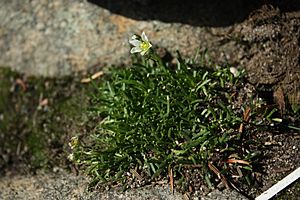Greenland stitchwort facts for kids
Quick facts for kids Greenland stitchwort |
|
|---|---|
 |
|
| Minuartia groenlandica in Adirondacks Park, New York state | |
| Scientific classification |
|
| Kingdom: | Plantae |
| Clade: | Tracheophytes |
| Clade: | Angiosperms |
| Clade: | Eudicots |
| Order: | Caryophyllales |
| Family: | Caryophyllaceae |
| Genus: | Minuartia |
| Species: |
M. groenlandica
|
| Binomial name | |
| Minuartia groenlandica (Retz.) Ostenf.
|
|
| Script error: The function "autoWithCaption" does not exist. | |
| Synonyms | |
|
|
Script error: No such module "Check for conflicting parameters".
The Greenland stitchwort (scientific name: Minuartia groenlandica) is a small, rare plant. It's also known by other names like mountain stitchwort or mountain sandwort. This plant is a perennial, which means it lives for more than two years and often comes back each spring.
It grows in low clumps, with its stems connected at the bottom. Each slender stem has three to five pairs of leaves that grow opposite each other. The main stem branches out into many small flower clusters. Its white flowers grow about five to ten centimeters above the thick leaves. Each white petal is six to ten millimeters long, and there are five green leaf-like parts called sepals around the petals.
Contents
Where the Greenland Stitchwort Lives
This plant likes to live in high, isolated places, like large mountain tops. You can find it in several parts of Canada, including Nunavut, Ontario, Quebec, Newfoundland and Labrador, and Nova Scotia.
In the United States, it grows in states like Maine, New Hampshire, Vermont, New York, West Virginia, Maryland, Virginia, Tennessee, North Carolina, and South Carolina. It also grows in Greenland.
Life Cycle and Reproduction
The Greenland stitchwort usually flowers for about two weeks in the middle of July. However, it can bloom anytime from June to August. During this time, pollen is moved from one flower to another by insects. This process helps the plant make seeds.
The most helpful insect for moving pollen is the yellow-banded bumblebee (Bombus terricola). These bees have tiny hairs that collect pollen. They also crawl all over the flowers, even when it's too cold for them to fly, which helps spread the pollen.
What Kind of Home It Likes
The Greenland stitchwort prefers to grow in high-up areas where the natural rock is exposed. You can find it on rocky ledges and in fine gravel on slopes. The soil in these areas is usually a bit acidic (with a pH of 3.1 to 4). It doesn't have much nitrogen or phosphorus, but it has a lot of organic matter.
These areas are often very cloudy, foggy, and get a lot of rain. For example, on Mount Washington in New Hampshire, where this plant grows, the average rainfall is about 1837.5 millimeters per year. The wind is also very strong, averaging 50 kilometers per hour, and the average yearly temperature is very cold, around -3.0 degrees Celsius.
Conservation Status
The Greenland stitchwort is a special plant, and its numbers are watched carefully. In Nova Scotia, Canada, it is considered sensitive to human activities and natural events. Its conservation status there is "yellow," meaning it needs attention.
Conservation Status in the United States
In the United States, this plant is listed with different conservation statuses depending on the state:
- It is listed as endangered (meaning it's at high risk of disappearing) in Connecticut and Maryland.
- It is listed as threatened (meaning it could become endangered soon) in Kentucky, New Hampshire, New York, Pennsylvania, and Rhode Island.
- It is a special concern (meaning it needs monitoring) in Maine.
Scientists once studied Minuartia groenlandica to see if it could be used on rooftops for insulation or as part of urban green spaces. However, it couldn't handle dry periods for long enough to be used this way.
 | William Lucy |
 | Charles Hayes |
 | Cleveland Robinson |

